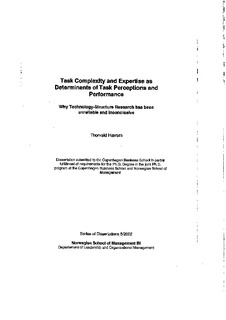| dc.description.abstract | The revolutionary developments of new technologies are not paralleled in the research on consequences of technology in organizations. Approximately four decades have passed since Woodward’s (1958) findings of relationships between technology and organizational structures and about 35 years since Perrow (1967) conceptualized his much researched technology construct. Subsequent years of research in organization have mainly yielded inconclusive research results on relationships between technology and structure.
This study suggests that developments in other areas, such as research on human information processing and in the understanding of objective task complexity, may explain why research on relationships between technology and structure has shown such inconclusive results. Through an analysis of Perrow’s technology construct, it is concluded that the construct confounds objective and subjective characteristics of the task. It is further argued that this confounding is common to most task-related research in organization theory.
A theory is developed regarding how task-doers of different degrees of expertise perceive different dimensions of objective task complexity differently. This theoretical chapter concludes with the presentation of a research model consisting of 14 hypotheses of how degrees of expertise and objective task complexity influence the perceptions of task variability, analyzability, and performance.
Based on this theory, and due to the confounding of objective and subjective task characteristics, it is proposed that the Perrow inspired technology construct is a poor predictor. A competing model - the two dimensions in the technology construct on the one hand, and the objective task complexity and expertise constructs on the other – is developed and tested with respect to its power to predict performance. A mixed two-factor within-subjects experimental design with three levels is applied, with 19 novices, 23 intermediates and 22 experts.
The results of the MANOVA-analysis demonstrate that expertise, objective task complexity and their interaction significantly influence perceptions of task variability and analyzability. A disordinal interaction effect between expertise and objective task complexity eliminates much of their main effects and demonstrates how the confounding of subjective and objective elements in the technology construct does in fact compromise its reliability and validity as a predictor. A test of the competing models reveals that the model with task complexity and expertise has a R2 73% higher than the two dimensions in Perrow’s technology construct.
The consequences of these results for technology–structure research and for contingency theory in general are clear: The confounding of objective task complexity and the individuals’ perceptual propensities has detrimental effects to validity and reliability. These are contributing to the inconsistent results in the technology–structure research. This has for task related research unambiguous implications for measurement and control of subjective and objective variables as degree of expertise and objective task complexity. Finally, consequences for practice are discussed, specifically with respect to division of labor, development of routines and learning. | no_NO |
